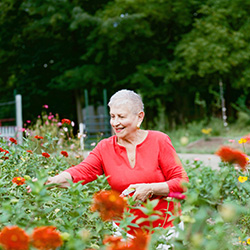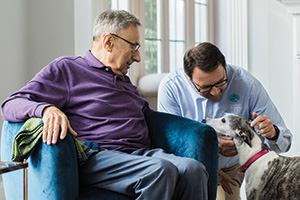Home Care for Those Living with Parkinson’s Disease
 Comfort Keepers of Central-Northern New Hampshire helps those living with Parkinson’s disease manage the progression of this neurodegenerative brain disorder. Whether it be fear, confusion, or disbelief - we've got you covered! We know there isn't yet a cure for this condition but until one comes along our team will provide assistance in every step toward wellness.
Comfort Keepers of Central-Northern New Hampshire helps those living with Parkinson’s disease manage the progression of this neurodegenerative brain disorder. Whether it be fear, confusion, or disbelief - we've got you covered! We know there isn't yet a cure for this condition but until one comes along our team will provide assistance in every step toward wellness.
Parkinson’s disease can be a difficult illness to manage, especially as it progresses. Many people with Parkinson’s eventually require specialized care that they cannot get at home. This is where Comfort Keepers can help. Our home care services are designed to provide comfort and support for those living with Parkinson’s disease in New Hampshire. We offer a wide range of services, including medication management, feeding tube assistance, personal care, and light housekeeping. We can also help with mobility assistance and fall prevention. We understand the challenges that come with managing this illness, and we are here to help you live comfortably at home.
Exercise and Daily Mobility
 Both are essential for people suffering from Parkinson's disease. Though the condition affects different people in different ways, one of the most common symptoms is muscle rigidity, which can make it difficult or even impossible to move. Studies have shown that regular physical activity can help to improve quality of life for people with Parkinson's. In addition to improving physical health, exercise has also been shown to improve mental well-being, sleep quality, and mood. Our professional caregivers can assist with helping people with Parkinson’s stay mobile and active. Our Interactive Caregiving approach is geared towards assisting with keeping the body, mind, and spirit positive and moving in the right direction.
Both are essential for people suffering from Parkinson's disease. Though the condition affects different people in different ways, one of the most common symptoms is muscle rigidity, which can make it difficult or even impossible to move. Studies have shown that regular physical activity can help to improve quality of life for people with Parkinson's. In addition to improving physical health, exercise has also been shown to improve mental well-being, sleep quality, and mood. Our professional caregivers can assist with helping people with Parkinson’s stay mobile and active. Our Interactive Caregiving approach is geared towards assisting with keeping the body, mind, and spirit positive and moving in the right direction.
Respite Care
Caring for a loved one with Parkinson's disease can be a rewarding experience, but it can also be physically and emotionally demanding. While there is no cure for Parkinson's disease, respite care can provide much-needed relief for family caregivers. Respite care is temporary care provided by another individual, typically a professional caregiver. This type of care can provide a much-needed break for caregivers, allowing them to take some time for themselves. Respite care can also help to relieve some of the physical demands of caregiving, such as providing transportation to medical appointments or helping with activities of daily living. In addition, respite care can provide important emotional support, offering compassion and understanding to both caregivers and their loved ones. While there is no easy solution to the challenges of caregiving, respite care can make a real difference in the lives of those affected by Parkinson's disease.
Nutrition and Meal Planning for Parkinson's Disease
When it comes to nutrition and meal planning for Parkinson's disease, there are a few things to keep in mind. First, it's important to make sure that you're getting enough of the right nutrients. This means eating plenty of fruits, vegetables, whole grains, and lean protein. It's also important to limit your intake of saturated fats, processed foods, and refined sugars. In addition, it's important to stay hydrated by drinking plenty of water throughout the day.
Second, it's important to create a meal plan that works for you. This will vary depending on your individual needs and preferences, but there are a few general guidelines to keep in mind. Part of the ways we help families and people with Parkinson’s is meal preparation. Following your medical provider or dietitian’s recommendations we can prepare meals for use later in the day or week and include some healthy snacks for in between meals. Besides meal preparation our caregivers make excellent companions and also can assist with medication reminders, laundry, light housekeeping and more.
Personal Supervision and Home Safety for Parkinson's Disease
For people with Parkinson's disease, personal supervision can be essential for maintaining safety at home. This is because Parkinson's can cause a number of balance and coordination problems, which can lead to falls. In addition, Parkinson's can also cause changes in behavior, which may result in a person taking risks that they would not normally take. As a result, it is important for caregivers to provide close supervision, especially when a person is engaging in activities that could be dangerous. This may include cooking, using power tools, or working around hazardous materials. By providing close supervision, our home caregivers can help ensure that their loved ones with Parkinson's stay safe at home.
Transportation
For people with Parkinson's disease, transportation can be a major challenge. The condition can cause problems with balance and coordination, making it difficult to drive or use public transportation. In addition, the symptoms of Parkinson's can vary from day to day, making it hard to predict when one will be able to get around. As a result, many people with Parkinson's rely on friends and family members for transportation. However, this can be a burden on loved ones, and it can limit the independence of people with the condition. We provide incidental transportation to doctor’s appointments, can assist with grocery shopping or even just a taking a ride to get out of the house and see some of the natural beauty and historic sites in the surrounding areas of New Hampshire.










